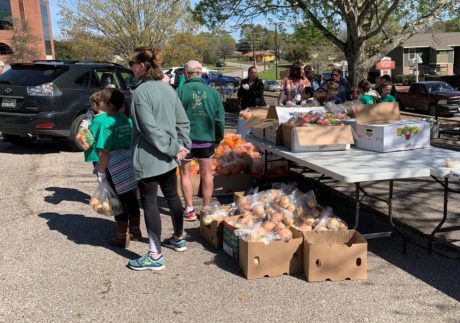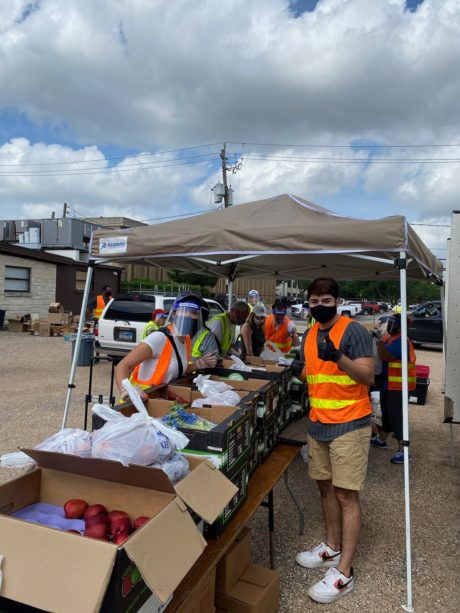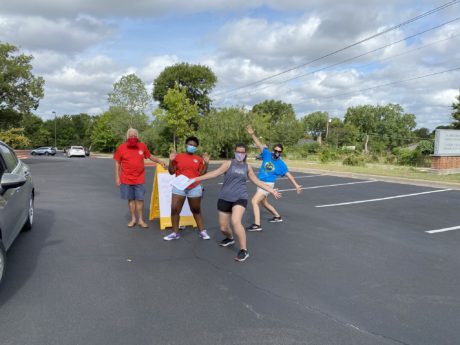The COVID-19 pandemic has forced churches to invent new ways of worshiping online and to create virtual formation and education opportunities using Zoom and other tools. When church outreach ministries aren’t able to gather people, the challenges to overcome are multiplied. Providing care for vulnerable populations, many of whom already struggle with meeting basic needs, is complicated by the fact that most of them have little to no internet connectivity.
EHF supports congregations in their ministries that focus on poverty, mental health, organizing communities, and racial justice. During the pandemic EHF has been gathering leaders for problem solving in these areas, connecting churches to consultants, and providing community for peer to peer listening and conversations.

St. Peters, Brenham
“When COVID hit, St. Peter’s food ministry team immediately looked for ways to continue to keep the three food pantries open”, shares The Rev. Carol Peterson, Deacon and Parish Nurse at St. Peter’s in Brenham.
Only minor changes were needed to keep the once-a-month drive through pantry going. The second pantry located on-site at the church also made a rapid shift by moving to an honor system based self-serve food bag pick up.
However, their satellite pantry at the Brenham Housing Authority remained open simply because of the power of relationships and community leadership. Working with a member of the resident council in the Public Housing project, they were able to devise a solution that kept that pantry open by moving all operations outdoors and by increasing the number of home deliveries to people with disabilities. This allowed for hundreds of people in need to continue to be served.
“These changes happened because St. Peter was in relationship with a leader within the Public Housing complex who also volunteers as a co-coordinator for the pantry,” Rev. Peterson said. “They were not only someone that received a service, they were also someone with ideas and capacity to help problem solve.”

San Pedro, Pasadena, San Pablo and San Mateo, Houston
The Hispanic Congregations of San Pedro, San Mateo and San Pablo are all in predominately-Hispanic communities that have been hit hard by COVID on multiple fronts. Many families are front-line workers without the option of working from home. Many others have lost jobs because of business closures. Government stimulus checks and other efforts to provide support have not been available for many members of these congregations because of legal status or fear that receiving help would result in being denied future legal status. The lack of money for rent, food, bills, and other necessities intensifies an already dire COVID-19 situation.
These churches are partnering to provide sustained family aid and mental health support to the community. They’re also ramping up existing food support and feeding thousands of families a week. They are putting themselves on the front line to make sure their communities are fed.
“We have established a relationship with the Houston Food Bank to distribute food every Thursday to 2,000 to 3,000 individuals,” said The Rev. Ed Gomez, Vicar of San Pablo/St. Paul’s, Houston.
The churches have also raised tens of thousands of dollars for rental assistance to help families keep a roof over their heads. Alongside other Episcopal congregations, the churches also partnered with The Metropolitan Organization (TMO) and Central Texas Interfaith to help leverage over $140 million in rental and housing assistance for low income residents in Austin and Harris County on the verge of eviction.

St. James Episcopal Church, Austin
Before the pandemic, the Neighbor 2 Neighbor community ministry of St. James Episcopal Church in Austin served a double purpose: a site for distribution of basic needs assistance and a place for gathering members of the community.
Prior to March when Austin began sheltering in place, Neighbor 2 Neighbor served on average 80 households at each of their twice-monthly gatherings. Since March, with the help of new community partnerships, they have pivoted to deliver basic needs assistance, especially food, diapers, and utilities assistance, with a focus on households with members who are over the age of 55 or immunocompromised.
“Community formation happens through our volunteer training and check-ins on Zoom, and through lots and lots of one-on-one phone and text conversations with our neighbors, which let them know that they are not alone,” said The Rev. Eileen O’Brien, Rector of St. James.
Many of the volunteers are seniors themselves and have found the outreach work of connecting with people to be very rewarding.
“Through phone and text check-ins with our neighbors, they are helping maintain the relational fabric of our community,” O’Brien said.
As of August, Neighbor 2 Neighbor is now sending 10,000 pounds of food out the door weekly for contactless delivery to approximately 150 households or 400 distinct individuals. The project is also delivering diapers, incontinence, and hygiene products to approximately 100 households weekly.